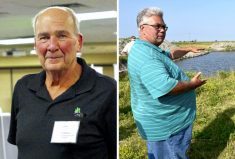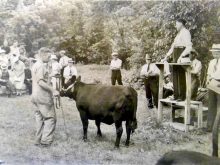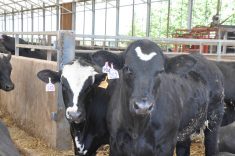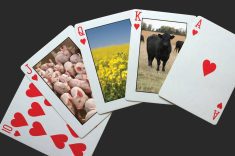Canadian agriculture collectively forms a large and busy lobby.
Last year, two canola groups cracked the top 10 busiest lobby groups in all Canadian sectors, according to “The Lobby Monitor” website. On top was the Canadian Canola Growers Association.
Though the ag lobby outworks other industries or interests, farmers may think no one listens to them or their representatives.
Read Also

VIDEO: Manitoba’s Past Lane – Jan. 31
Manitoba, 1946 — Post-war rations for both people and cows: The latest look back at over a century of the Manitoba Co-operator
Why it matters: An effective lobby can change the course of government, but only through sustained effort.
In a recent blog post, farmer and ag entrepreneur Kristjan Hebert published a poll he’d run on Twitter in which nearly 21 per cent respondents said grower groups were actually a hindrance in Ottawa.
About 37 per cent said groups neither helped nor hindered, and about 42 per cent said they helped agriculture’s influence in Canada. Nearly 250 people responded to the poll.
“I do believe there is value in some of these groups but I know I’m not the only one to question the impact of these dues we pay,” wrote Hebert.
“Our voice becomes so fractured by the time it gets to Ottawa that it’s no wonder we can’t get our points across,” he added, noting industries like railways and chemical companies are not burdened with representing tens of thousands of voices to officials.
After a February panel discussion on policy and lobbying work at CropConnect in Winnipeg, many farmers wanted to know what ag lobbyists do in Ottawa.
So, the Co-operator asked them.
Making friends
A key theme among the answers was the vital role that relationships play. This includes relationships with politicians and government staff, relationships with other commodity groups, and connections with related industries.
“It is definitely a relationship business,” said Dave Carey, CCGA’s vice-president of government and industry relations.
He described a typical workday in which he meets and talks with members of Parliament, Senators and their staff. These conversations range from introductory (what CCGA is and why canola producers are important), to relationship building, to promoting the policy interests of canola growers. Lobbyists raise specific concerns or opportunities and they always present solutions, Carey said.
“Building relationships in Ottawa is the most effective thing I can possibly do on your behalf,” said Brandon Leslie, who works in government relations for Grain Growers of Canada. Leslie spoke during the agriculture policy at CropConnect.
“Part of my job is becoming friends with members of Parliament,” Leslie said. He described a friendship he developed with a parliamentary secretary for one of the federal ministers.
“That’s actually been developed over a number of years and a number of rounds of golf.”
As Bill C-234 makes its way through Parliament, which would see natural gas and propane added to the list of farm fuels exempted from carbon pricing, Leslie has tried to sway the secretary’s opinion.
“Over beers, I say to Frank, ‘just don’t get in the way. Just let it happen,’” Leslie said. “That is how we get things done.”
Lobbyists also explain agricultural matters to government staff, said Greg Northey, vice-president of corporate affairs with Pulse Canada. While many lower-level Agriculture and Agri-food Canada staff have expertise, higher-level bureaucrats may be there for their management skills.
Also, “they’re heavily influenced by the government of the day and what their focus is,” Northey said. “That percolates down into everything within the department.”
Alliances between ag groups can also be key and they may work together on issues that affect multiple groups.
“We can have the best idea in the world and articulate that to government and have it all backed up with policy and research,” Carey said. “One of the first things you get asked by government, whether that’s elected or the department, is ‘what does everyone else think of this?’”
For example, the Ag Carbon Alliance, which has pushed for the passage of Bill C-234, comprises 15 national producer groups.
A good idea
However, before meetings, beers or rounds of golf, groups have to set priorities and assemble the information to back them up.
Policy concerns and priorities generally come from the boards of producer groups, which are generally composed of farmers expected to represent the concerns of those in their regions.
Once those are determined, a groups’ policy staff will research the concerns and find solutions they can propose.
“We don’t raise issues unless we have a suggested path forward,” Carey said.
Groups also react to the government’s ideas and proposals, said Leslie. They respond to consultations and work to ensure government staff understand the full implications of what they’re proposing.
“We try to proactively ensure that we’re doing two things: one, educating government and two, providing a level of understanding of what matters to the folks in this room agronomically and economically,” Leslie said.
“Inevitably the question you’re going to get is OK, what is the actual impact? Can you give me a number?” Northey said.
Strategy is also important — analyzing the key decision makers and identifying which ones will be open to an idea. Certain “political realities” must be considered, said Carey.
In the case of Bill C-234, the Liberal government introduced carbon pricing and would be reluctant to advance policy that might erode the price signals it’s intended to send, Carey said.
“Instead of just arguing with the Liberals about carbon pricing, we went a different route.”
Ag groups found a listening ear in Conservative MP Ben Lobb, who was willing to put forward a private members’ bill.
The minority government also factors into strategy. In majority governments, private members’ bills like Lobb’s tend to fail because the governing party can outvote them.
In a minority, if the bill garners enough support from opposition parties, it may be passed. So ag lobbyists have been meeting with opposition MPs to ask for support.
“A minority government is less predictable but it’s also more opportunities for opposition parties to really impact the kind of legislative agenda,” Carey said.
Crowded city
Ag lobbyists find themselves working on an expanding slate of issues.
When asked why canola groups were so busy in 2022, CCGA president Rick White said that besides the resumption of in-person meetings post-pandemic, and a long list of issues, CCGA is expanding its influence beyond agriculture and trade. It has branched into economic development and the health department, and sustainability and the environment is “in every department,” White said.
Ottawa is also a crowded city, even more so post-pandemic, Carey said. During the pandemic, lobbyists could meet with officials over Zoom, so they didn’t need a physical presence in Ottawa. Now, they’ve flooded the market.
CCGA has to be there, “day in and day out, telling our story,” Carey said.
Northey said criticism usually isn’t helpful. Instead, ag lobbyists need to be present and show they’re making an effort.
“You need to be consistent but constructive,” he said.
















